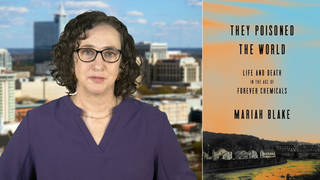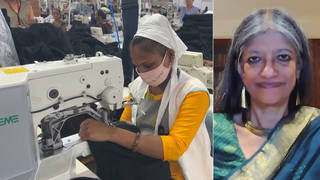
Former President Donald Trump’s legal team rested its case Thursday in the rape, battery and defamation trial brought by writer E. Jean Carroll without calling a single witness. Carroll has accused Trump of raping her in a dressing room at Bergdorf Goodman in the 1990s. Carroll was able to file the case against Trump decades later because New York opened a one-year window on the statute of limitations for adult survivors of sexual assault. Trump says he may still ask to testify before jury deliberations are set to begin next week. The lawsuit against Trump is a major effort to counter the “long-standing tradition in our culture of protecting powerful men from consequences for sexual assault and sexual harassment,” says Deborah Tuerkheimer, law professor at Northwestern University and the author of Credible: Why We Doubt Accusers and Protect Abusers.
Transcript
AMY GOODMAN: This is Democracy Now!, democracynow.org. I’m Amy Goodman.
Former President Donald Trump’s legal team rested its case Thursday in the rape, battery and defamation trial brought by writer E. Jean Carroll, without Trump’s lawyer calling a single witness. E. Jean Carroll has accused Trump of raping her in the dressing room of Bergdorf Goodman in the ’90s. She was able to file the civil case against Trump decades later because New York opened a one-year window on the statute of limitations for adult survivors of sexual assault.
In addition to Carroll, her legal team called two other witnesses to testify about Trump’s pattern of assaulting women. Jessica Leeds testified Trump repeatedly groped her during a flight in the 1970s. This was Leeds speaking years ago.
JESSICA LEEDS: It was a real shock when all of a sudden his hands were all over me. But it’s when he started putting his hand up my skirt, and that was it. That was it.
AMY GOODMAN: Journalist Natasha Stoynoff also took the stand and recounted how Trump allegedly pushed her against a wall, forcibly kissed her during a 2005 interview at Mar-a-Lago. The jury was also shown the infamous Access Hollywood video in which Trump brags about grabbing women’s genitals without asking permission.
DONALD TRUMP: I better use some Tic Tacs just in case I start kissing her. You know, I’m automatically attracted to beautiful — I just start kissing them. It’s like a magnet. I just kiss. I don’t even wait. And when you’re a star, they let you do it. You can do anything.
BILLY BUSH: Whatever you want.
DONALD TRUMP: Grab ’em by the pussy. You can do anything.
AMY GOODMAN: In a videotaped deposition shown to the jurors, Trump was asked about his comments in the Access Hollywood tape. He said, quote, “Historically, that’s true with stars, if you look over the last million years,” Trump said. Trump also claimed E. Jean Carroll’s story was made up and that she wasn’t his type. He also said in the tape to the lawyer questioning him in the deposition, “You wouldn’t be a choice of mine, either, to be honest.” Trump waived his right to testify in the case, but on Thursday he told reporters he may return from playing golf in Ireland to testify and “confront” Carroll.
DONALD TRUMP: And I have to go back for a woman that made a false accusation about me, and I have a judge who’s extremely hostile. And I’m going to go back, and I’m going to confront this woman.
AMY GOODMAN: When the judge heard this, he said that Trump has until Sunday at 5:00 to notify the judge if he will reopen the case and testify. Closing arguments are set for next week with jury deliberation starting Tuesday.
For more, we’re joined by Deborah Tuerkheimer, professor of law at Northwestern University, author of Credible: Why We Doubt Accusers and Protect Abusers. Her New York Times guest essay is headlined “The Importance of E. Jean Carroll’s Lawsuit Against Donald Trump.”
Welcome to Democracy Now! Professor Tuerkheimer, if you can start off by responding to what’s happened so far in this case? You have — this is a civil case. E. Jean Carroll could bring women, who she didn’t know, who had accused Donald Trump of sexually assaulting them — two of them testified — and two of her dear friends, who she said she told immediately after she said President Trump raped her back in the ’90s in a dressing room.
DEBORAH TUERKHEIMER: Right. I think it’s important to say first that the testimony of an accuser is rarely enough to persuade the jury. That’s true inside the courtroom. That’s true outside the courtroom. The idea of credibility discounting is a really important one. Credibility discounting is rampant today, and it’s been rampant throughout our history. So, for E. Jean Carroll to prevail, she’s going to need quite a bit of corroborating evidence. She’s going to need witnesses who support her story.
And that’s what we’ve seen in this trial. As you mentioned, she’s brought in two women who heard her describe this account very close in time to the incident alleged. And then she’s brought in what we call pattern and practice witnesses, two women who’ve described sexually aggressive conduct on the part of Donald Trump, that allows the jury to see this as part of a kind of pattern that he engages in. You couple that with the Access Hollywood tape, and E. Jean Carroll’s lawyers have presented a powerful case, a case that very much offers the jury support for E. Jean Carroll’s story.
AMY GOODMAN: Now, explain what it means that this is a civil trial. If he is found guilty, what does this mean? And also that at the same time that his lawyers said they rest their case, Donald Trump is playing golf in Ireland, saying he’s going to testify.
DEBORAH TUERKHEIMER: Right. So, if E. Jean Carroll prevails, Donald Trump is not found guilty, per se; he’s found liable. He’s found liable for damages. Because, as you mentioned, this is a civil case, not a criminal case, the burden of proof is lower than what we understand to be proof beyond a reasonable doubt. Here, she has got to show by a preponderance of the evidence, meaning it’s more likely than not that he raped her, as she said he did. And if she does that, if she convinces the jury, then the jury, again, will award her, presumably, some damages. And the same is true of her defamation claim. What’s at issue here is damages.
Donald Trump does not need to testify. It’s somewhat unusual, particularly in a civil case, for a defendant not to present evidence, and particularly to tell his version of events. That’s his right. He’s obviously made noise about coming back to court at the 11th hour. I think most commentators and observers are skeptical that he’s actually going to do that. But, of course, Donald Trump is unpredictable, and we’ll wait and see what happens this weekend.
AMY GOODMAN: Even if he doesn’t testify, did it surprise you that not one witness was brought forward by the defense?
DEBORAH TUERKHEIMER: Yes. The defense had a witness list. It ended up not calling anyone on that list. But again, typically in a civil case, there are two sides, and both sides are going to present some witnesses. Particularly because the cross-examination of E. Jean Carroll and the cross-examinations of the other witnesses that she called didn’t seem to go especially well, one might have expected the defense to present its own evidence in this case. As you’ve said, the defense did not.
AMY GOODMAN: And, Professor Tuerkheimer, why could E. Jean Carroll bring this case decades later? Explain the law that was just passed in New York.
DEBORAH TUERKHEIMER: New York passed a groundbreaking law. It’s called the Adult Survivors Act. The only other state to have passed a law like it, dealing with adult survivors of sexual violence, is California. And it went into effect in November of 2022, providing a one-year, essentially, lookback window, so that there is no statute of limitations that bars claims. Plaintiffs can go back in time as far as they want to go back, as long as they were 18 or older at the time the incident alleged, and they can bring those claims in civil court. They can sue for damages.
AMY GOODMAN: If you can talk about now what this means and why you think this trial is so important? As you talk about in your book, Credible, who is able to bring their cases forward?
DEBORAH TUERKHEIMER: Well, this is important because, in part, Donald Trump really has come to represent, for so many women and other people, male sexual entitlement. The book is really about a long-standing tradition in our culture of protecting powerful men from consequences for sexual assault and sexual harassment.
And so, here, we’re seeing E. Jean Carroll come forward, against all odds, many years later, believing and hoping that the culture has shifted some, at least enough for her to be believed. That’s not something that she felt she would have been back in the '90s. But now, post-#MeToo, and as the #MeToo movement moves along, we'll see whether she’s able to get that kind of belief and that kind of justice, a measure of justice, it should be said. Again, a civil case, this is not about criminal punishment. This is not being brought by the state.
But for E. Jean Carroll to come forward and insist that it happened, that she’s not to blame, and that it matters, is quite heroic. It’s quite brave. And we’ll be watching, I think all of us, with great interest to see what this jury of nine individuals decides in the case.
AMY GOODMAN: And finally, Deborah Tuerkheimer, how do you think this case fits into all the other investigations of Donald Trump? It wasn’t often included when we talk about the New York attorney general investigating him, the DA investigating him, the Georgia DA investigating him, the federal government investigating him.
DEBORAH TUERKHEIMER: Yeah, it’s such an interesting question. Those other investigations focus on Donald Trump’s conduct as president, as a businessperson and as someone who’s left the office of the presidency. These are all somewhat extraordinary and unusual kinds of conduct, or misconduct, that he is alleged to have engaged in.
What’s so interesting to me about this case is that the kind of allegation that E. Jean Carroll is articulating is so sadly commonplace. It’s so widely experienced by so many individuals in our society. Of course, it’s extraordinary that the allegation comes against someone who’s been president and who is the top contender for the Republican nomination, but there’s so much that’s familiar about the allegation and the kind of credibility discounting that’s gone on in the case, that kept her quiet for so many decades, that I think it’s relatable to many individuals. And so, in that way, it’s different from the other kinds of cases, I think.
AMY GOODMAN: And the jury being anonymous?
DEBORAH TUERKHEIMER: Yes. I think, for fairly obvious reasons, the judge wanted the jury to remain anonymous. The jury itself wanted to be anonymous. These are the kinds of allegations that — well, we certainly don’t want to see any tampering. We don’t want to see any threats against this jury. And this is a high-profile case, the highest-profile case of this sort that we’ve seen in our history, and it’s really important that the jury is able to do its job.
AMY GOODMAN: Deborah Tuerkheimer, professor of law at Northwestern University, author of the book Credible: Why We Doubt Accusers and Protect Abusers. We’ll link to your New York Times op-ed, “The Importance of E. Jean Carroll’s Lawsuit Against Donald Trump.”
Coming up, Freedom to Learn protests held across the country against right-wing efforts to ban books and antiracism education in schools. In Florida, 14 Dream Defenders were arrested staging a peaceful sit-in inside the offices of Republican governor and possible presidential candidate Ron DeSantis. Back in 30 seconds.












Media Options